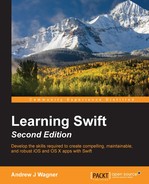We have only covered a single concept, optionals, in this chapter, but we have seen that this is a pretty dense topic. We have seen that at the surface level, optionals are pretty straightforward. They are a way to represent a variable that has no value. However, there are multiple ways to get access to the value wrapped within an optional that have very specific use cases. Optional binding is always preferred, as it is the safest method, but we can also use forced unwrapping if we are confident that an optional is not nil. We also have a type called implicitly unwrapped optional, to delay the assigning of a variable that is not intended to be optional; however, we should use it sparingly because there is almost always a better alternative.
Now that we have a firm understanding of optionals, we can begin to look at something else that may appear minor on the surface but actually opens up a whole world of possibilities. All functions in Swift are actually variables or constants themselves. We will explore what this means in the next chapter.
